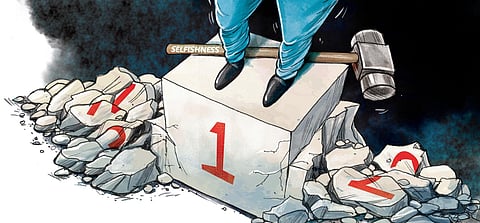

Whenever someone is pulled up for jumping the queue at, say, passport counters in international airports, we are embarrassed—as it is almost always an Indian or an equally insensitive person from our immediate neighbours. As soon as a plane lands or a train stops, everyone jumps up and seems to be in a tearing hurry, jostling with co-passengers, to get out. It may sound too sweeping to brand an entire people as too restlessly self-centred, but we all know that it is quite true. We are not arguing that others may not be self-obsessed; we are only trying to understand why most of us appear to be so inconsiderately pushy.
In 1976, Richard Dawkins created quite a stir with his The Selfish Gene, where he declared that winning genes are self-reinforcing and spread faster and greater because they succeed in achieving their tasks. He also introduced the theory of ‘memes’ describing them as elements of a culture or systems of behaviour that are passed from one individual to another—by imitation. As in the physical world, in society too ‘memes’ or imitational behaviour spread more voluminously if they achieve their targeted gains. Applying this trait to our society, we may put it rather simply and surmise that everyone pushes around as those who pushed first profited in their objective. They were not reprimanded despite violating normal decency and patience, and they succeeded in moving forward, even at the cost of causing discomfort to others. On the other hand, Dutch historian Rutger Bergman argues in his recent book, Humankind, that humans are not as intrinsically selfish as believed. He insists, after considerable mapping of humans and their actions, that acts of kindness are also powerfully contagious.
What then triggers the ‘me-first’ attitude among Indians that really stands out more in international comparisons? Honking cars unnecessarily is just another aspect of this same inconsiderate social behaviour. The same person would be driving perfectly quietly, without blowing his horn, if he were abroad and there he would abide by the consensus or face heavy fines and public scorn. The same unconcerned disposition is quite visible in the practice of keeping our homes as clean as possible but bothering little about littering public places and thoroughfares. Before we go deeper in examining why our inclinations differ so sharply when it comes to ‘common concerns’, let us also analyse the notable international sporting events where Indians have won medals. We are talking of the Olympics (woefully few medals), Commonwealth Games, Asian Games and such other prestigious championships.
We discover that almost all of these medals were for individual excellence—shooting, wrestling, boxing, athletics, badminton, tennis, weightlifting, chess, swimming and so on. Yes, we have won medals in team games like hockey, which is really an exception to this ‘rule’. Our post-colonial obsession with cricket is thanks to the incredible amount of investment made in the game and in its seductive and addictive televising. The point is that we seem to excel where we have to fight it alone, whereas where we need to work as a team, say, in football, a nation of 1.3 billion has not yet produced its ‘eleven’ for top class international football.
The whole idea of this little exercise is not to denigrate but to try to understand the phenomenon. One possible reason is evident in the most populous religion on this subcontinent, on which base ‘grew’ other later religions. The mad rush at many temples and other sacred sites during festivals and pilgrimages is certainly not for the faint-hearted. And frankly, while everyone jostles, elbows and tramples over everyone else, we pray only for our welfare and prosperity and, of course, for our family. This, again, needs to be appreciated as an act of seeking ‘individual salvation’ ,not necessarily (or rarely) for the community. Abrahamic religions, on the other hand, emphasise communitarian brotherhood, while we are genetically programmed to obtain our own good, come what may. The lavish gifts or daana at the temples are often quite transactional in nature, and piety is quite purchasable—as in some churches.
How else would a completely unorganised religion that has no Vatican, no one Bible, no agreed cadre of preachers survive through so many millennia—had it not been for the mandate to pay for the services of the priest and the ritual practitioner? The latter belonged to one varna or caste group and were often quite captive within a society that demanded that they do not seek better vocations. We are, of course, referring to the prescribed norm. The short point is that this priesthood needed its clients and benefactors. They served them by connecting them directly to the Almighty, even if it warranted shoving others out of the way. What we need to note is that this class succeeded in uniting an incredibly diverse country by injecting common beliefs and rituals.
It is quite possible that we inherited this socially accepted behaviour that shaped our cultural genes and stamped our ‘memes’, which, in turn, left its indelible mark on our general attitude to life. The ‘community’ emerged much later—during the Bhakti movement, with bhajans and other institutions. But the core attitude continued to be self-oriented even when we became more inclusive and egalitarian.
Jawhar Sircar
Retired civil servant. Former Culture Secretary and ex-CEO, Prasar Bharati
(sircar.j@gmail.com, tweets @jawharsircar)